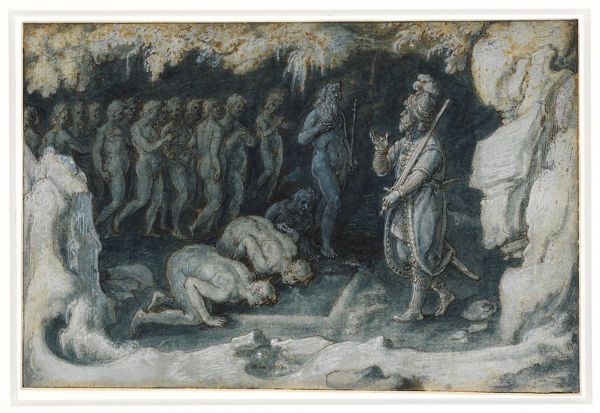Journey to the Underworld[1]
Book XI of the Odyssey shows Odysseus’ symbolic death and rebirth: a journey into the psyche of Odysseus in which he learns both about his past and future and comes to terms with his responsibilities as a leader, a father, a husband, and a hero. Perhaps most importantly Odysseus learns from the shades of his past the wisdom he needs to return home safely — to defeat his own selfish desires and those of his enemies. This descent is a personal one for Odysseus; though his crew joins him, they do not make it home, and they seem to represent an aspect of Odysseus’ psyche that he cannot control — free radicals that will eventually have to be dealt with in one way or another. While Odysseus meets many figures from his past and his culture, there are a few that hold key lessons for Odysseus.

His first lesson is one of his responsibility to his crew from the dead Elpenor. Odysseus and his men left Aiaia in such haste that they did not realize that Elpenor was not among them. Even men who are not heroes deserve respect; even those who do not die the deaths of heroes are a part of the community. So much like Gilgamesh’s lesson: leaders are judged by how they treat their community. This is an important lesson for Odysseus who shows imprudence toward his crew’s safety and well-being in several instances before this point, precipitating the death of many of them. Elpenor stands for those who served under Odysseus whom he owes much of his own success and survival even at the cost of their own lives.
From Teiresias, Odysseus learns of his immediate future, one that will be filled with anguish and the reason for that anguish: he blinded the son of Poseidon. If we consider Teiresias’ predictions, they are not really anything Odysseus did not either know, or could figure out. Perhaps Teiresias represents Odysseus’ buried unconscious: the monsters that he does not necessarily wish to face, but must in order to return home safely. After learning of the irate Poseidon, Odysseus receives two imperatives from Teiresias: you must deny yourself and restrain your shipmates if you are to survive the wrath of the sea god. Do not let your men touch the cattle of Helios, or it will spell destruction for ship and crew. This imperative is probably the most important for Odysseus, as it recalls Odysseus’ pride in telling the Cyclops exactly how blinded him, not practicing his characteristic shrewdness. If Odysseus is to land again on Ithaca, he must eschew the impulses that seem to make a great warrior like Achilles, and practice a cunning that will allow for a surreptitious return, not necessarily characteristic of a great warrior. While Odysseus will be successful with this first directive, he ultimately fails in the second, allowing his crew to meet their doom.

Odysseus learns, too, of the suitors ransacking his house and courting Penelope; he must make them atone in blood — “in open combat or by stealth” — for their perfidy. Odysseus will cunningly employ the latter before allowing the suitors to know that the lord of the manor has returned, unlike the unfortunate Agamemnon. Finally, Odysseus learns that his return to Ithaca will not mean the end of his wanderings: he will have another quest that will take him again from his home.
After learning of his future, Odysseus speaks with the shade of his mother Anticlea. From his mother, Odysseus learns of Penelope’s faithfulness, Telemachus’ duties as a magistrate (she died before Telemachus own coming of age), and Laertes’, Odysseus’s father, retirement to the country, unable to face the seeming fall of the house of Odysseus. Anticlea herself could not endure Odysseus’ absence precipitated her early death. Her words add to Odysseus’ pain and his urgency to return home to set his lands in order. Yet, in his despair, Anticlea warns him that he must “crave sunlight soon” — yes, all will die, but now is not Odysseus’ time. He must “Note all things strange / seen here, to tell your lady in after days.”[2]
While Odysseus meets many more shades — Heracles, Agamemnon, Sisyphus, Ajax, among others — one in particular strikes me as most important: Achilles. The greatest Greek warrior becomes the mouthpiece of the Odyssey in his brief interaction with Odysseus. The hero of the Trojan War asks Odysseus what he is doing where “the dimwitted dead are camped forever, / the after images of used-up men.”[3] The dead, indeed, are mute until Odysseus gives them blood; Achilles is no exception, yet the hero’s speech is more of an admonishment, an echo of Anticlea’s carpe diem. Odysseus’ answer to Achilles is flippant: you were the greatest, so fortunate in life that surely death must not pain you so much. Achilles speaks what could be the motto of the Odyssey:
| “ | Let me hear no smooth talk |
” |
Indeed, Achilles learns a wisdom in death that his rage blinded him to in life: nothing matters but life, not the petty differences of jealous men, not the the reckless rage of a wronged friend. It’s better to be alive and in bondage than just a mute shade. While Odysseus does not react to this speech explicitly, it does become a part of his drive to survive and overcome. Odysseus, unlike Achilles, is a survivor, and in order to for family and country to remain significant, one must live in order to maintain them. Death brings only silence, a grim view of a Greek afterlife; no Elysian Fields here.
While Odysseus hears much in the underworld, only the remaining books of the Odyssey illustrate what he learns, if anything. How is Odysseus reborn as a hero? What finally does he bring home to his community and to himself?
notes
